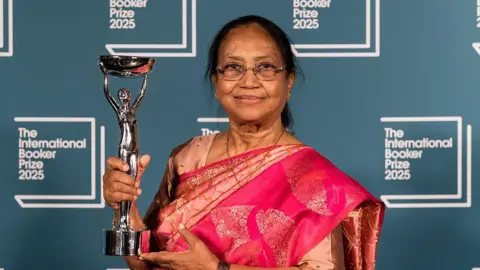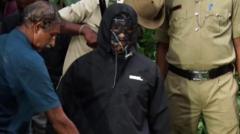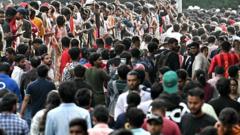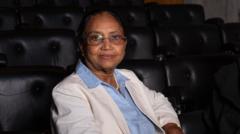International Booker Prize winning-author Banu Mushtaq has found herself in the midst of a controversy after she was invited to inaugurate a prominent festival in the southern Indian state of Karnataka.
Last week, the state's Congress government announced that Mushtaq - who won the Prize earlier this year for her short story anthology, Heart Lamp - would inaugurate the Mysuru Dasara festivities in Mysuru (formerly called Mysore).
Mysuru Dasara, also called Naada Habba (which roughly translates to festival of the land in Kannada), is an annual 10-day event that has been celebrated for decades.
Thousands of people flock to the city to participate in the grand festivities, which include cultural performances, elephant parades, exhibitions, and fireworks.
The decision to invite Mushtaq sparked criticism from some Bharatiya Janata Party (BJP) leaders - which is in the opposition in the state - who said that Mushtaq, a Karnataka-born Muslim, should not be inaugurating a Hindu festival.
Dussehra is a Hindu festival which celebrates the victory of good over evil, but Mysuru Dasara is conducted by the Karnataka state government and people of all faiths join in the celebrations.
Mushtaq has stated that she was honoured to be invited to the festival and that she felt deeply connected to it, having participated in the festivities herself as a child. But despite her expressing respect for the festival, the controversy has refused to die down.
Some BJP leaders have also taken offence to some of Banu's previous comments related to the Hindu goddess Bhuvaneshwari, who is considered to represent Kannada language and identity.
Musstaq made history earlier this year when she became the first author writing in the Kannada language to win an International Booker. Her award-winning book, Heart Lamp, which was translated into English by Deepa Bhasthi, was praised by judges for showcasing characters that were astonishing portraits of survival and resilience.
Mushtaq's stories, including in Heart Lamp, focus on the challenges women, especially Muslim women, face due to religious conservatism and a deeply patriarchal society. Interestingly, she isn't the first Muslim person to be invited to inaugurate the Mysuru Dasara festival. In 2017, KS Nisar Ahmed, a Kannada poet and author, had been bestowed with the honour.
Nevertheless, the invitation to Mushtaq has come under scrutiny from the BJP. BJP MP Yaduveer Wadiyar acknowledged Mushtaq's influence on Kannada writing, saying that her Booker win brought great pride to the Kannada literary fraternity. However, he added that the Mysuru Dasara festival wasn't a cultural event but a Hindu religious festival and demanded that Mushtaq clarify her reverence towards the two Hindu deities associated with the festival before agreeing to inaugurate it.
BJP leader Pratap Simha said that while it was acceptable for Mushtaq to chair literary festivals, it wasn't appropriate for her to be chief guest at an event like Mysuru Dasara. He also questioned if Mushtaq had faith in the festival's goddesses and if she followed Hindu traditions.
In the midst of the criticism, a video of a speech delivered by Mushtaq last January began circulating online. In her speech, she questioned the practice of associating a Hindu deity (Bhuvaneshwari) with Kannada language and identity, declaring it exclusionary to Muslims like herself.
Supporters of the invitation to Mushtaq argue that the row transcends her religious identity, framing it as a larger battle for keeping one of the state's biggest festivals open and welcoming to all faiths, as opposed to transforming it into a majoritarian event. Karnataka's Deputy Chief Minister DK Shivakumar defended his government's decision to invite Mushtaq, emphasizing the festival's inclusive character.
Mushtaq has not bowed to the pressure to decline the invite. Active politicians should have a sense of what to politicize and what not to, she told The Hindu newspaper.


















